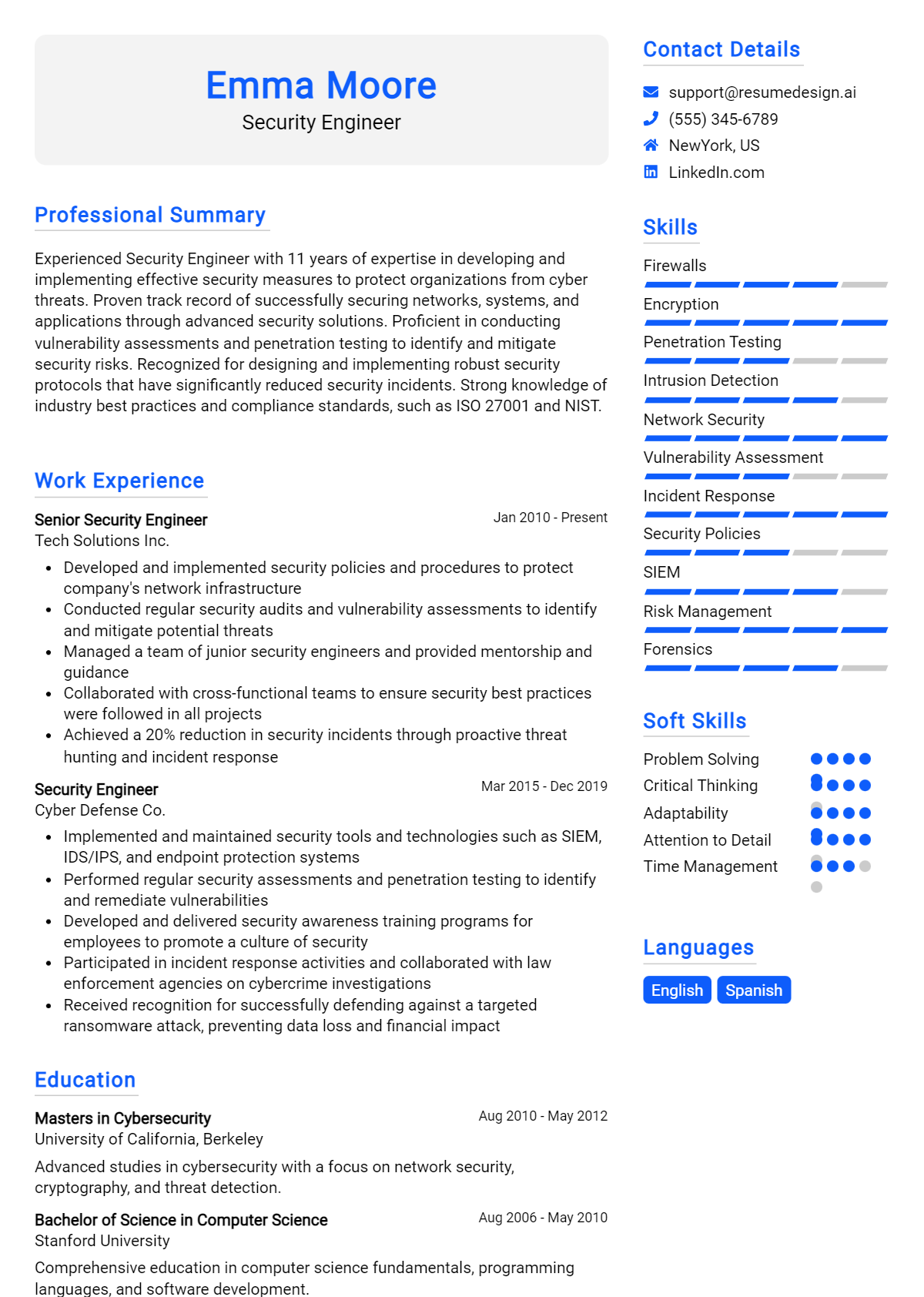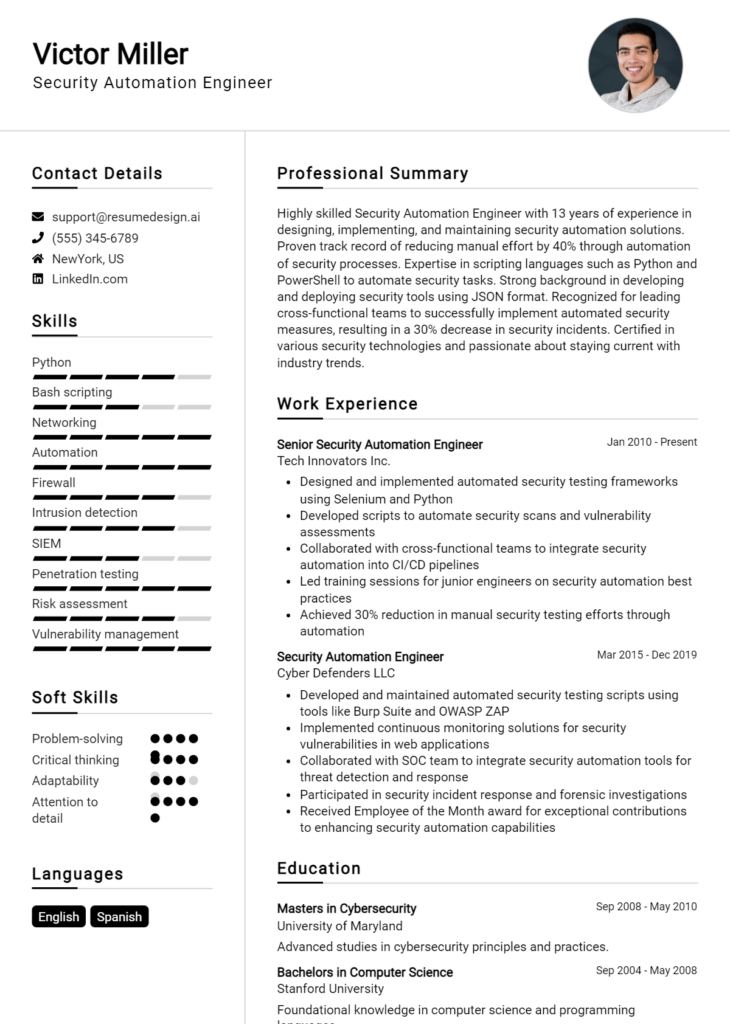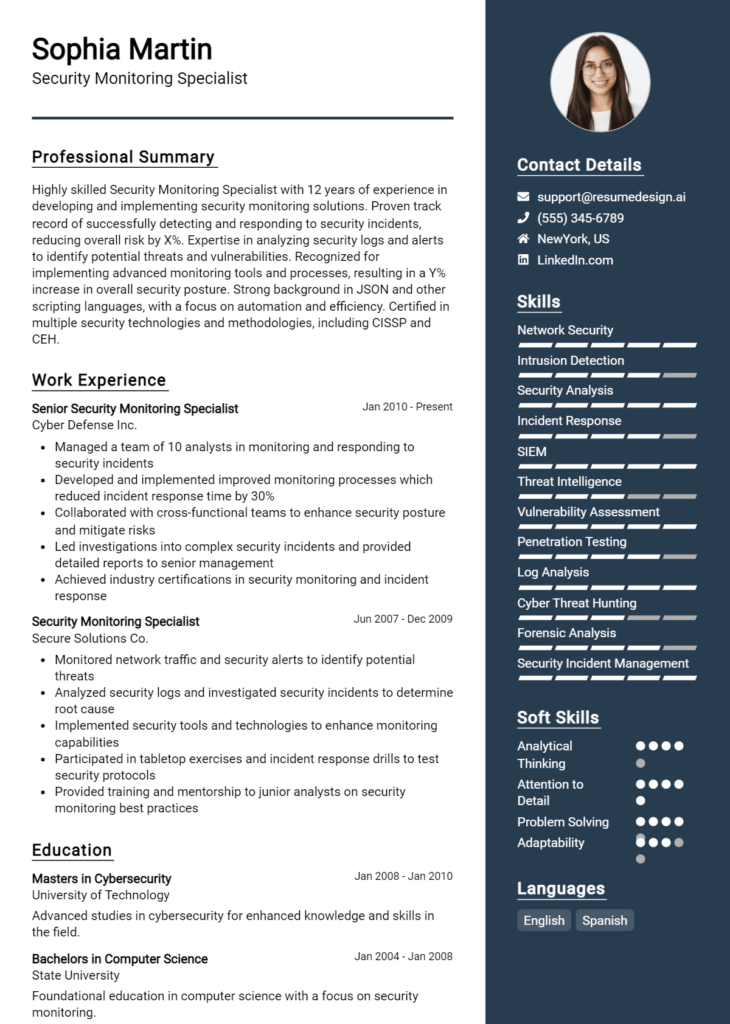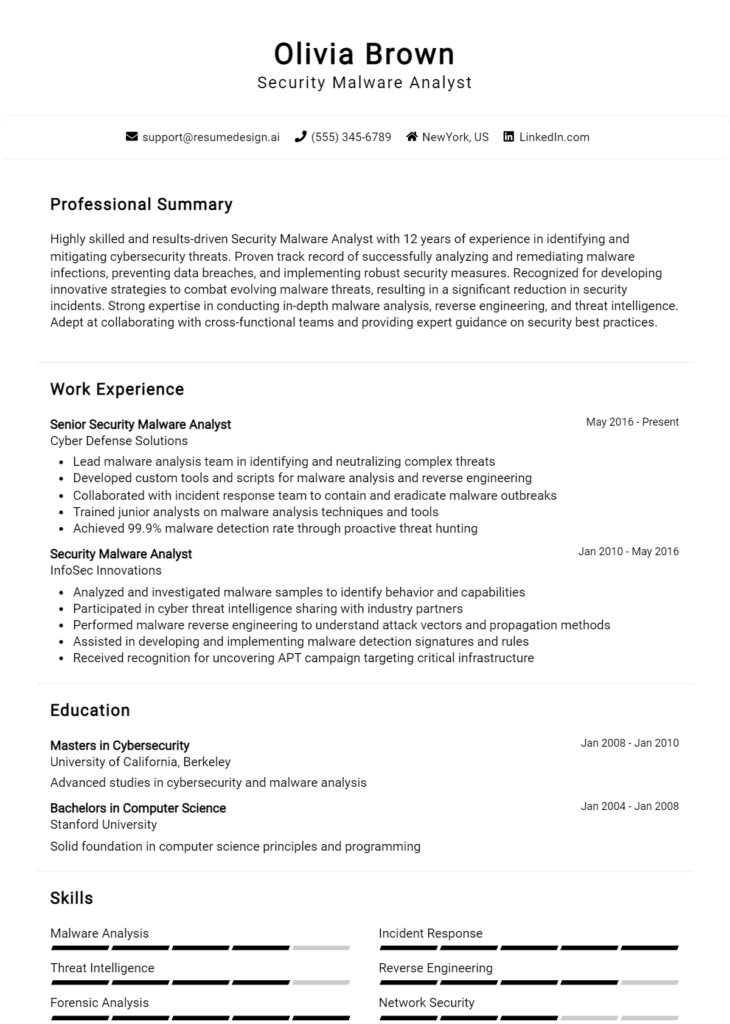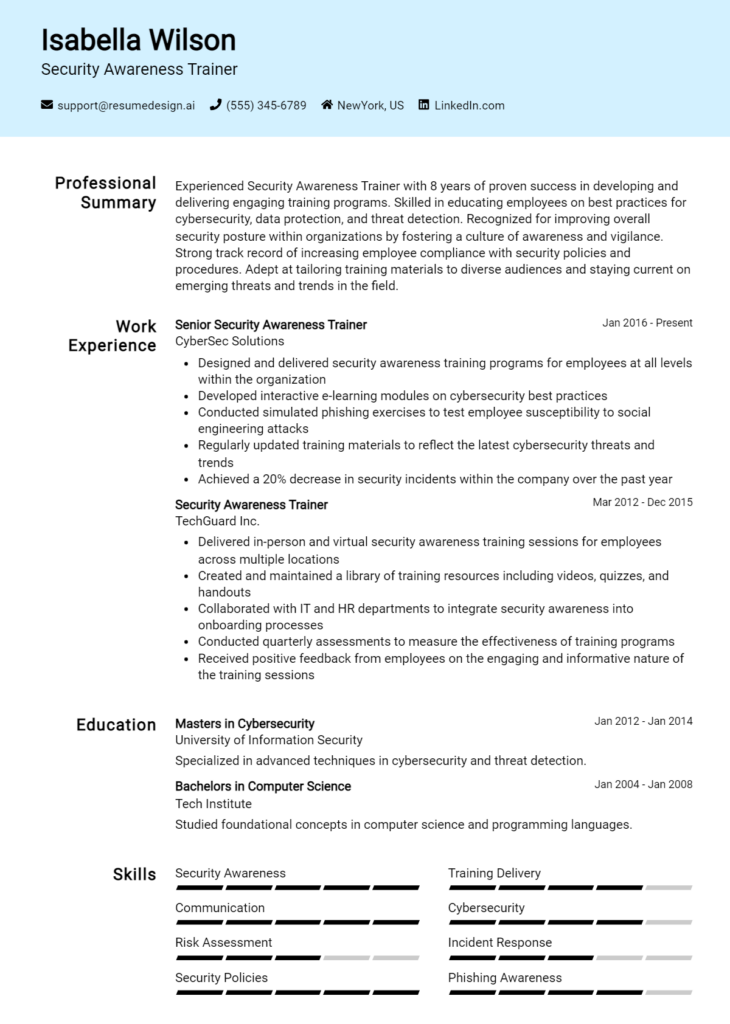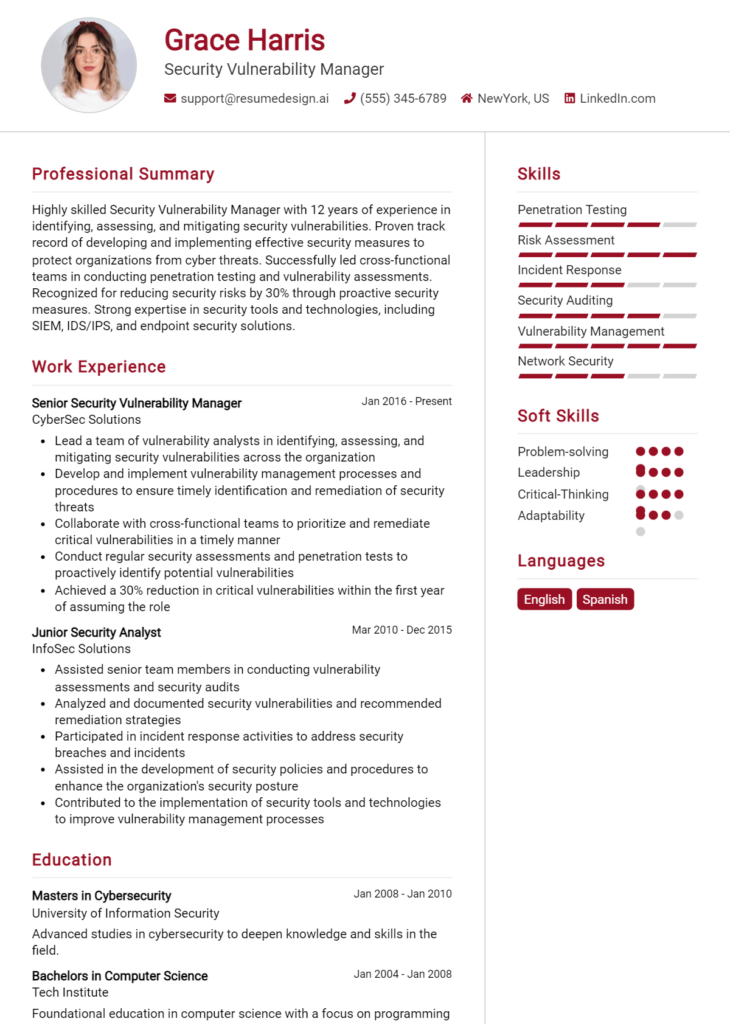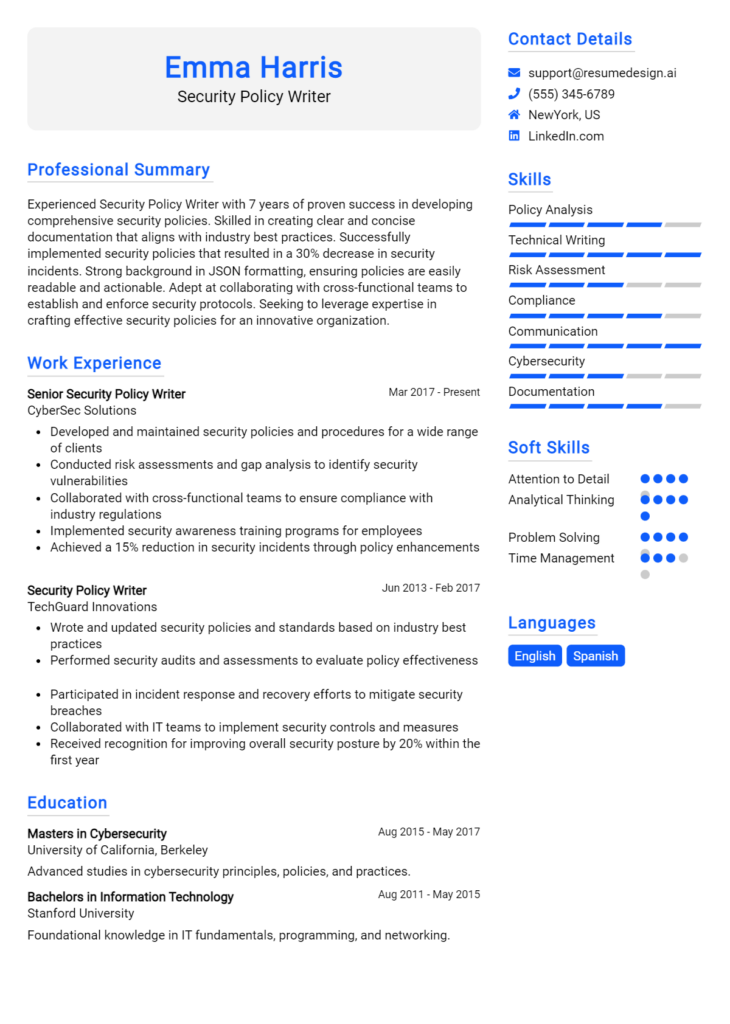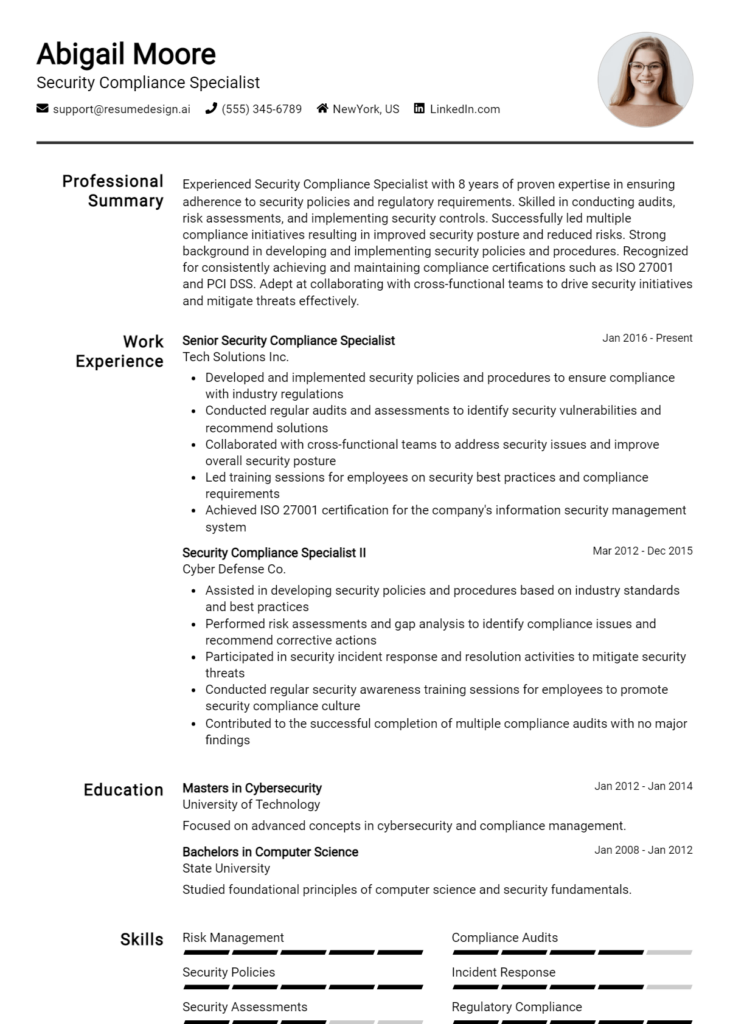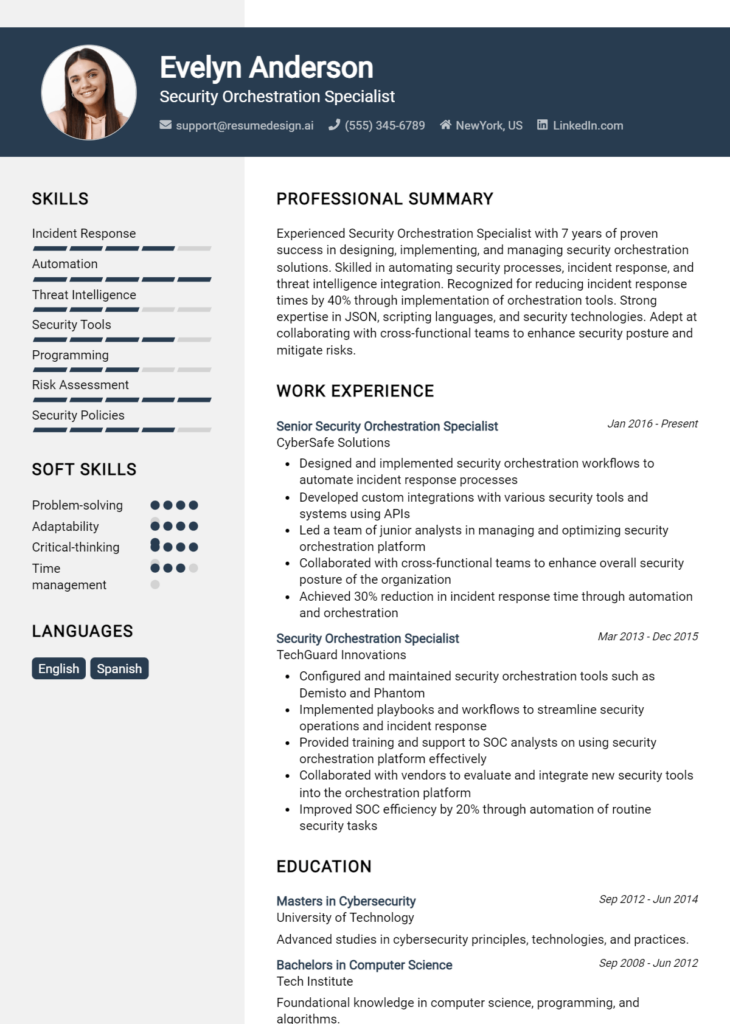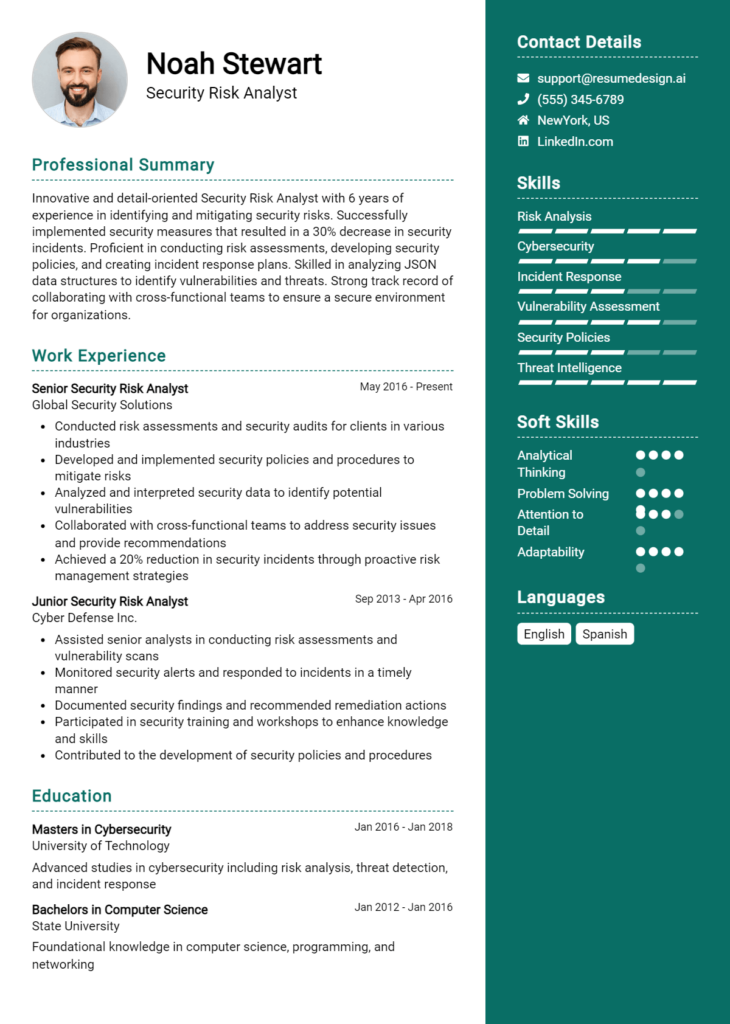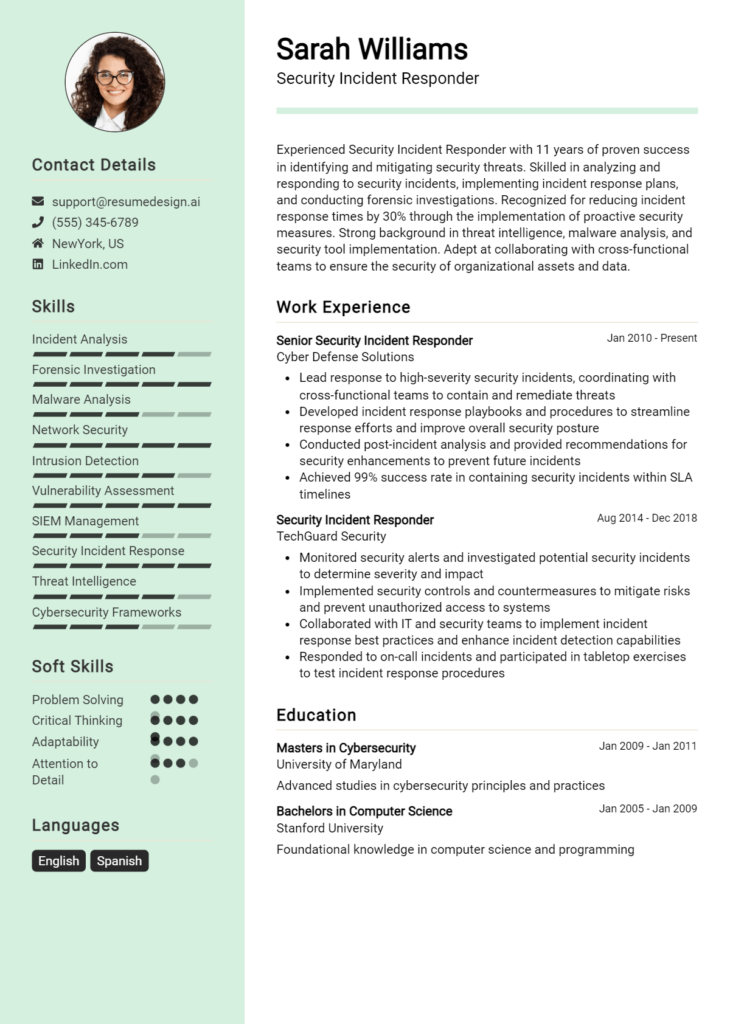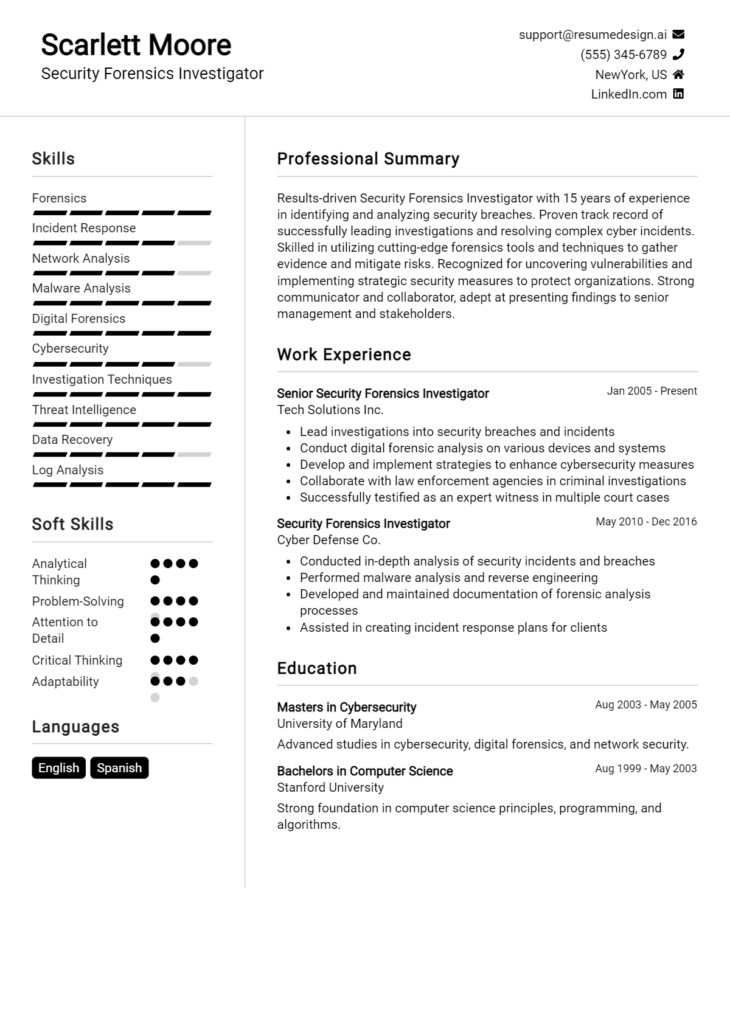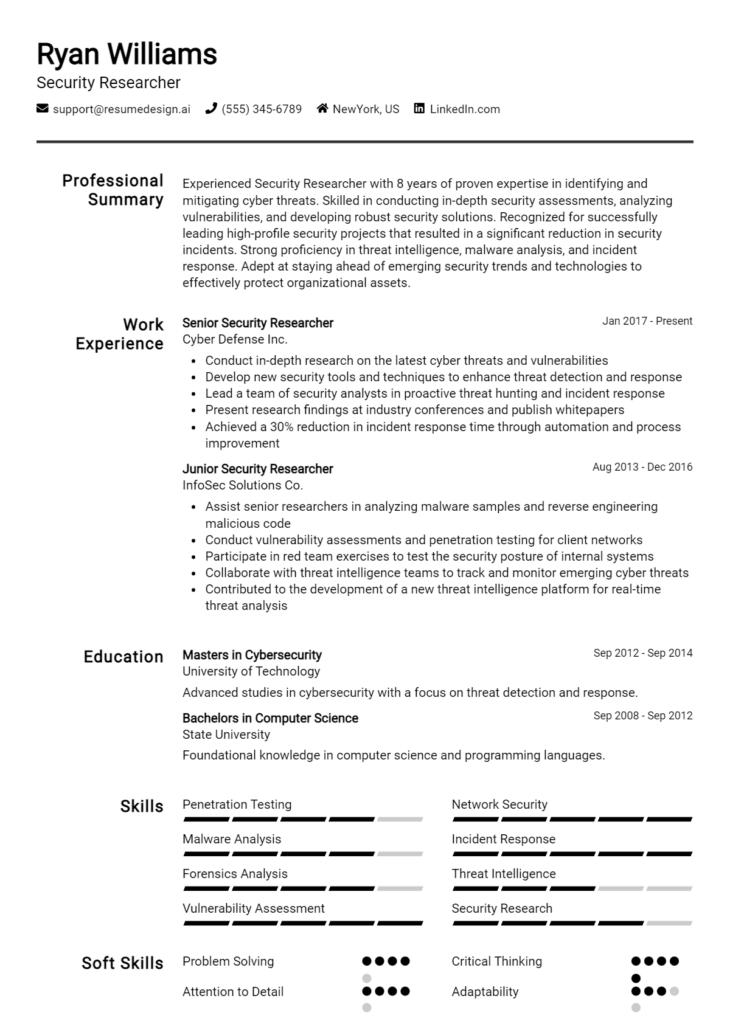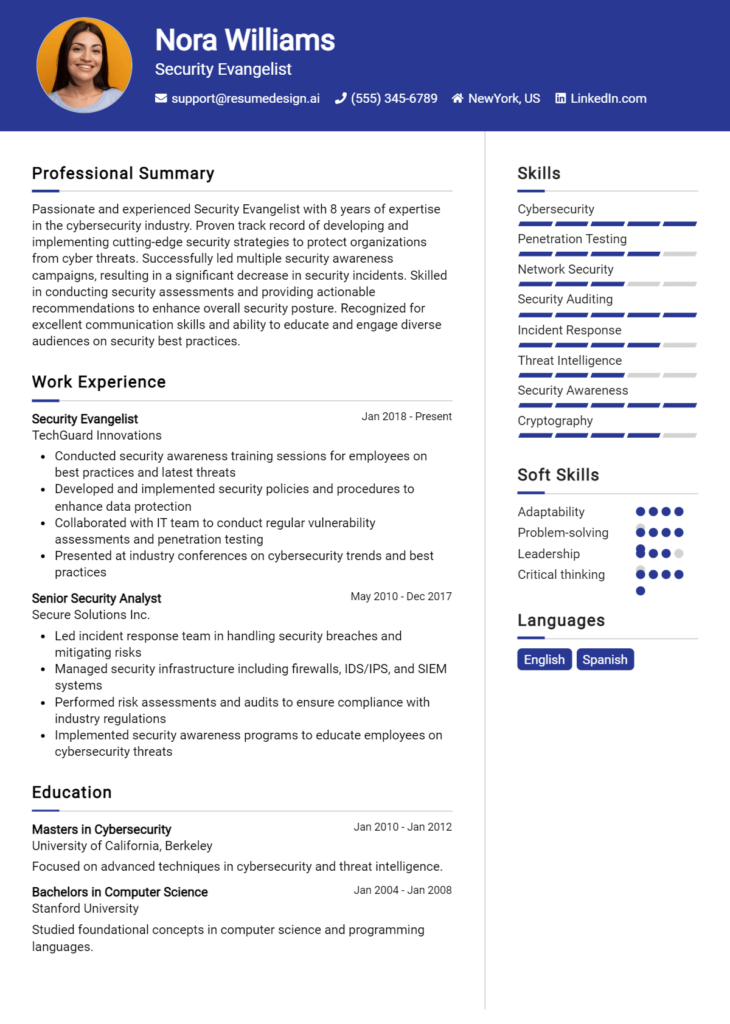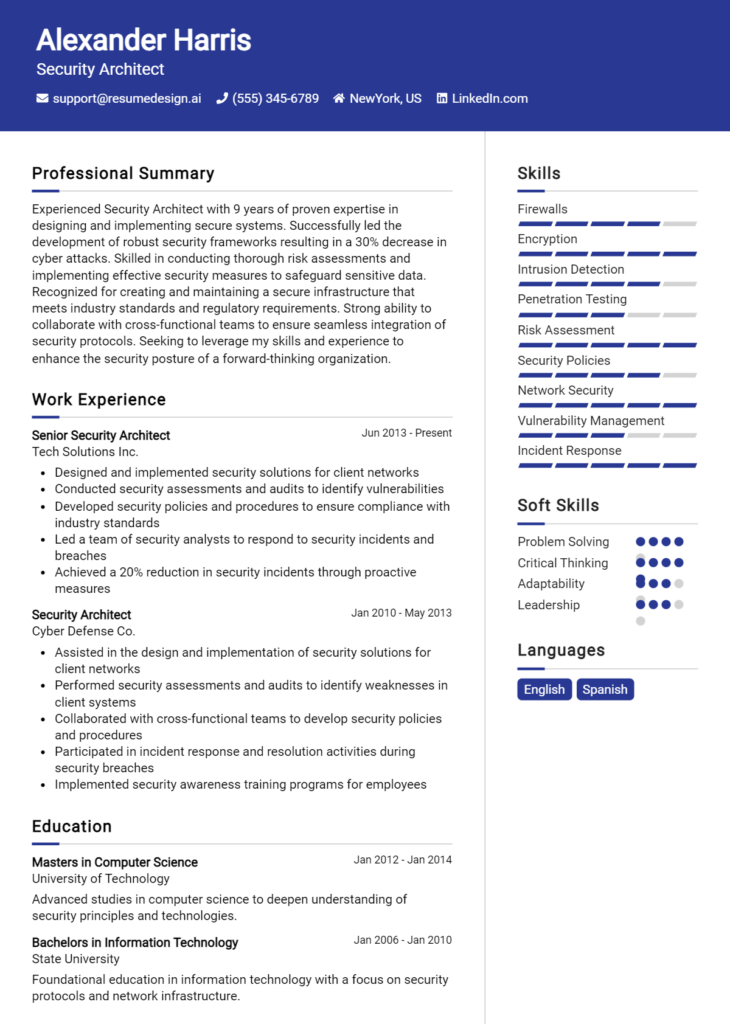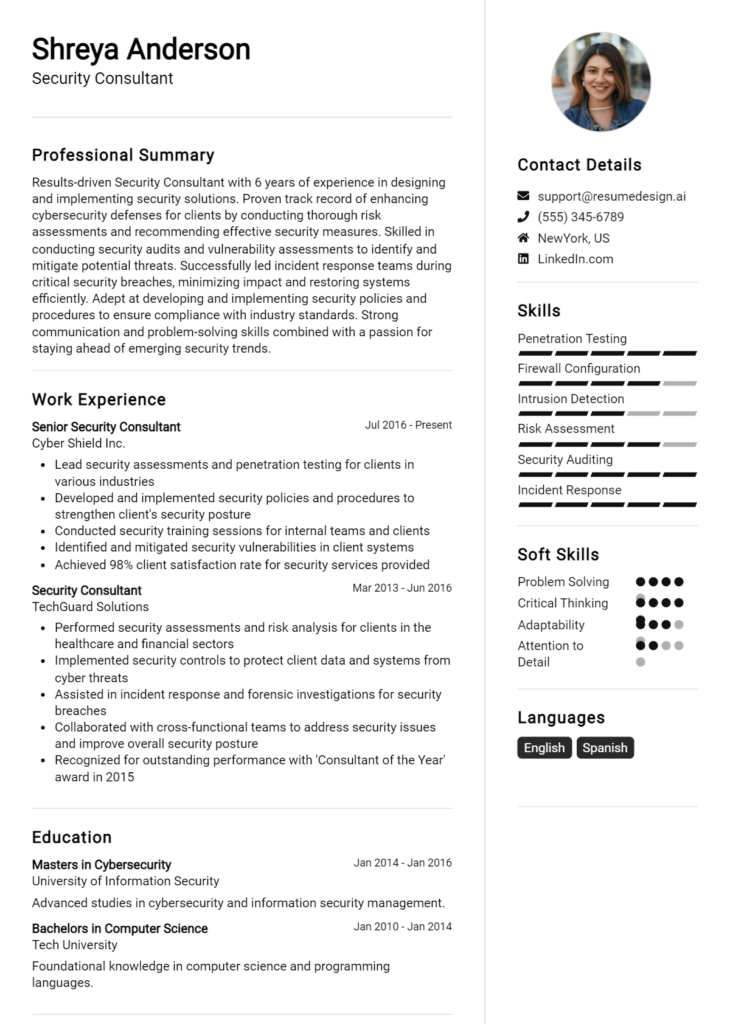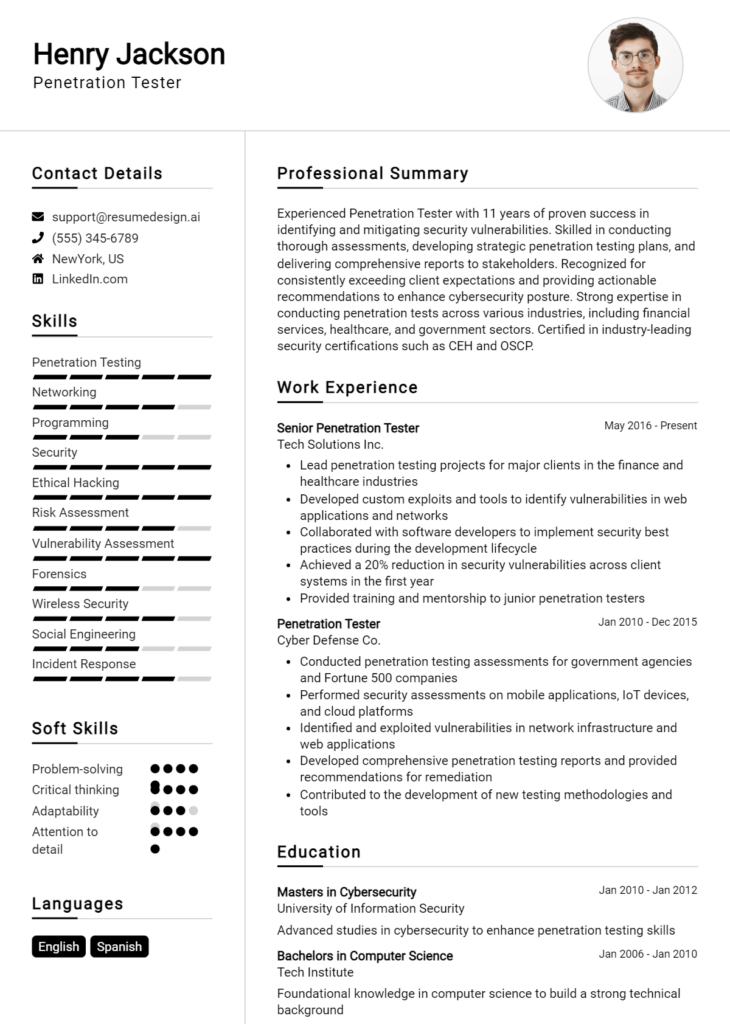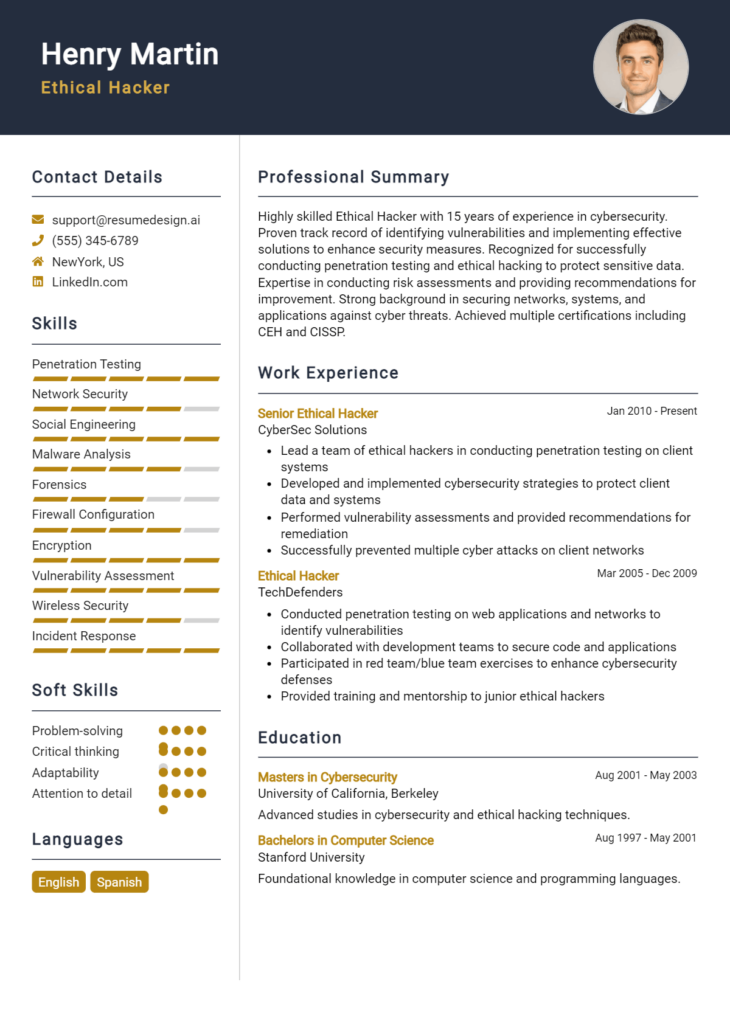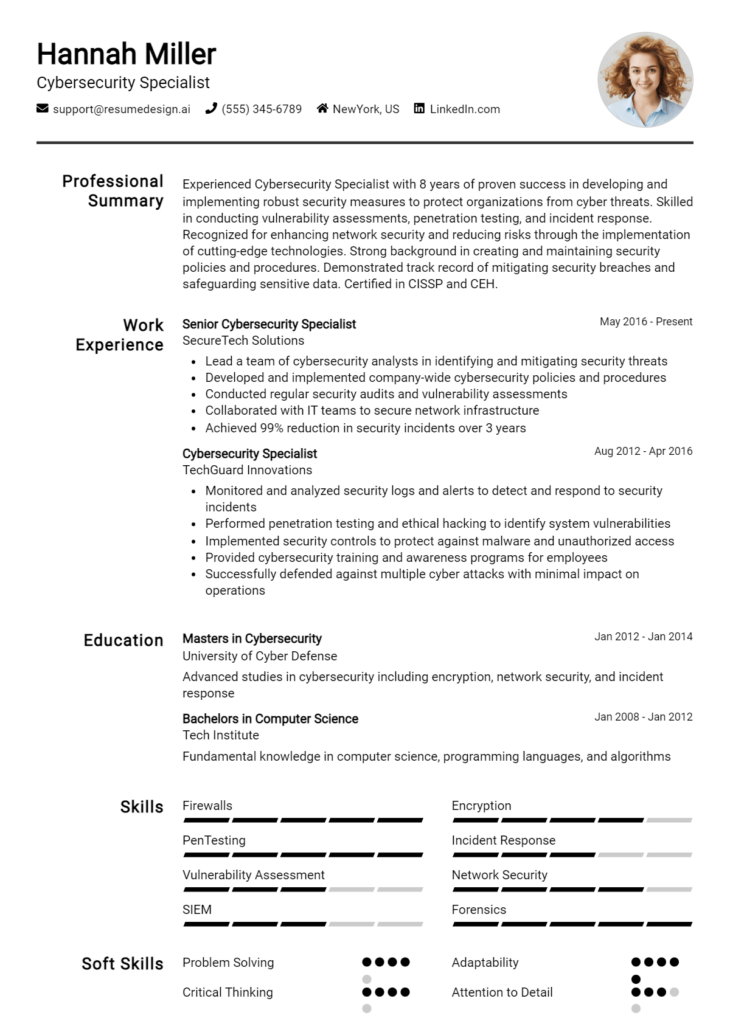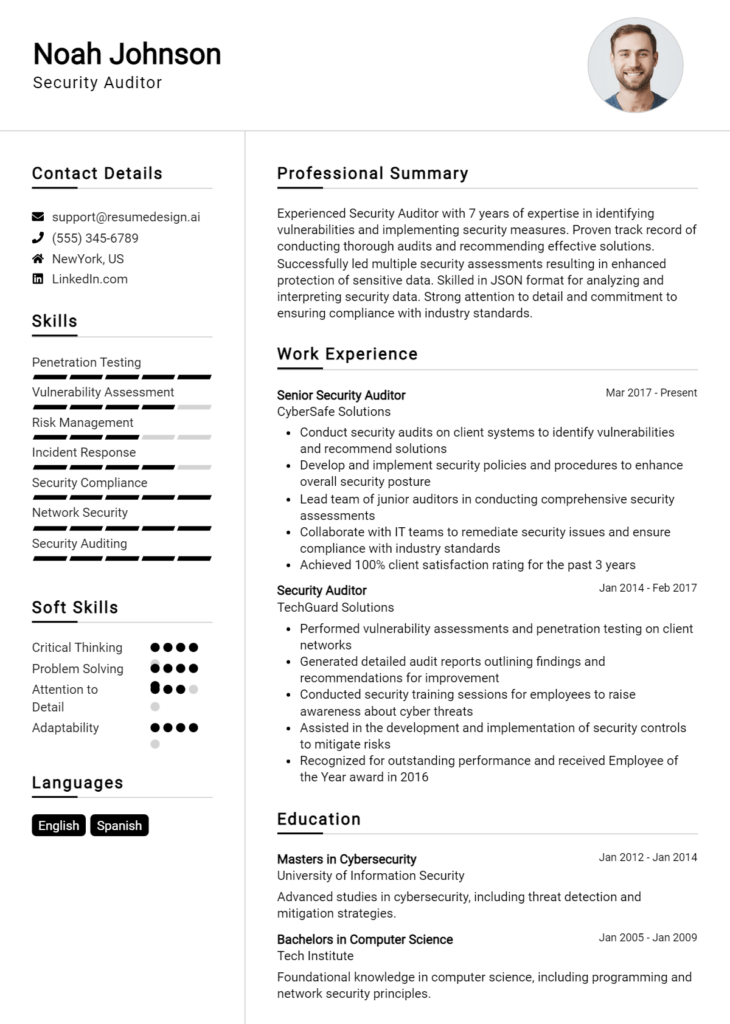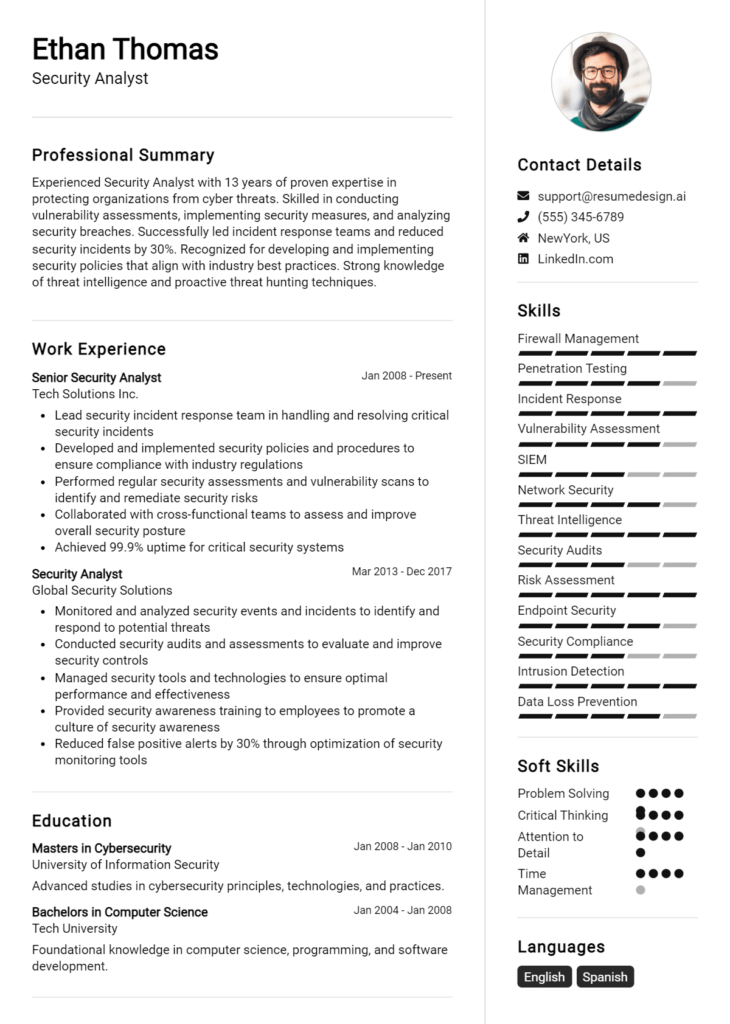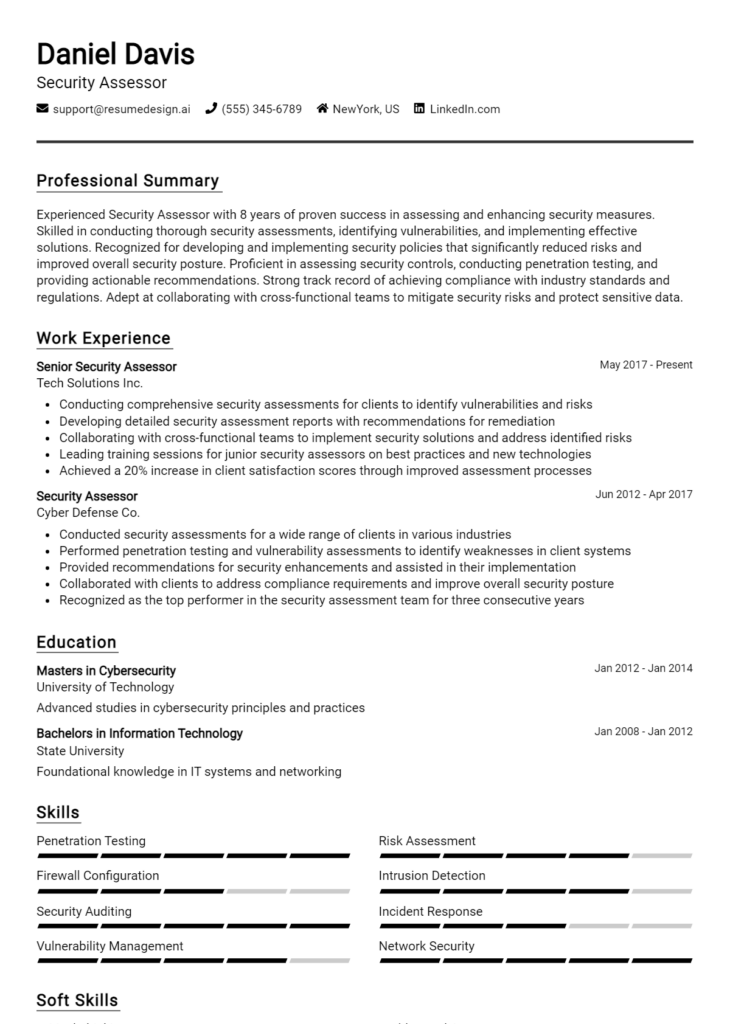Security Engineer Core Responsibilities
A Security Engineer plays a crucial role in safeguarding an organization's digital assets by implementing security measures and protocols. Key responsibilities include assessing vulnerabilities, monitoring networks for threats, and developing incident response strategies. This role requires technical expertise in cybersecurity tools, operational knowledge of IT systems, and strong problem-solving skills to address complex security challenges. By effectively collaborating across departments, a Security Engineer contributes significantly to organizational goals. A well-crafted resume that highlights these qualifications can demonstrate the candidate’s expertise and value to potential employers.
Common Responsibilities Listed on Security Engineer Resume
- Conducting regular security audits and assessments.
- Developing and implementing security policies and procedures.
- Monitoring network traffic for unusual activities.
- Responding to security incidents and breaches.
- Conducting risk assessments and vulnerability analyses.
- Configuring and managing firewalls and intrusion detection systems.
- Collaborating with IT and other departments on security initiatives.
- Staying updated on the latest cybersecurity trends and threats.
- Performing penetration testing and ethical hacking.
- Creating detailed reports on security incidents and metrics.
- Training employees on security best practices.
High-Level Resume Tips for Security Engineer Professionals
In the competitive landscape of cybersecurity, a well-crafted resume serves as a crucial tool for Security Engineer professionals looking to make a strong first impression on potential employers. Your resume is often the first point of contact between you and a hiring manager, making it essential to reflect not only your technical skills but also your significant achievements in the field. A compelling resume can effectively showcase your ability to safeguard information systems, demonstrate your problem-solving capabilities, and highlight your commitment to maintaining security standards. This guide will provide practical and actionable resume tips specifically tailored for Security Engineer professionals to help you stand out in a crowded job market.
Top Resume Tips for Security Engineer Professionals
- Tailor your resume to the specific job description by incorporating relevant keywords and phrases that mirror the employer's requirements.
- Highlight your technical skills, such as proficiency in firewalls, intrusion detection systems, and encryption technologies, to demonstrate your expertise.
- Showcase relevant experience by detailing past roles and responsibilities that align with the requirements of the position you are applying for.
- Quantify your achievements by using metrics and data; for example, mention how you improved system security by a specific percentage or reduced incident response time.
- Include certifications such as CISSP, CEH, or CISM to validate your credentials and commitment to continuous learning in the field.
- Emphasize experience with compliance standards and frameworks (e.g., NIST, ISO 27001) that are relevant to the role you are pursuing.
- Utilize action verbs to describe your contributions and accomplishments; words like "implemented," "developed," and "analyzed" can make your resume more dynamic.
- Incorporate soft skills such as teamwork, communication, and problem-solving, as these are vital in collaborative security environments.
- Keep your layout clean and easy to read, using bullet points and concise language to make it easy for hiring managers to quickly identify your key qualifications.
By implementing these tips, you can significantly enhance your resume, increasing your chances of landing a job in the Security Engineer field. A well-structured and tailored resume not only reflects your technical capabilities but also demonstrates your dedication and professionalism, making you a standout candidate in a highly specialized area.
Why Resume Headlines & Titles are Important for Security Engineer
In the competitive field of cybersecurity, a Security Engineer's resume must stand out to capture the attention of hiring managers. Resume headlines and titles play a crucial role in this process by serving as the first impression of a candidate's qualifications. A strong headline or title can immediately grab the attention of hiring managers, effectively summarizing key qualifications in one impactful phrase. It should be concise, relevant, and directly related to the specific job being applied for, allowing candidates to communicate their expertise and make a memorable statement about their professional identity.
Best Practices for Crafting Resume Headlines for Security Engineer
- Keep it concise—aim for one impactful phrase.
- Use role-specific keywords to align with the job description.
- Highlight your most relevant skills or certifications.
- Incorporate quantifiable achievements when possible.
- Avoid jargon or overly complex language.
- Make it unique to differentiate yourself from other candidates.
- Focus on what sets you apart in the security engineering field.
- Regularly update your headline to reflect new skills or experiences.
Example Resume Headlines for Security Engineer
Strong Resume Headlines
Certified Security Engineer with 5+ Years in Threat Analysis and Mitigation
Expert in Network Security and Risk Management with Proven Track Record
Results-Driven Security Engineer Specializing in Vulnerability Assessment
Innovative Cybersecurity Specialist with Hands-On Experience in Incident Response
Weak Resume Headlines
Security Engineer Looking for a Job
Experienced Professional in IT
Strong headlines are effective because they convey specific expertise and accomplishments that immediately resonate with hiring managers, making it clear why the candidate is a strong fit for the role. In contrast, weak headlines fail to impress due to their vagueness and lack of detail; they do not provide any insight into the candidate's qualifications or unique skills, making it difficult for hiring managers to see the value the candidate could bring to their organization.
Writing an Exceptional Security Engineer Resume Summary
The resume summary is a crucial component for any Security Engineer looking to make a strong impression in the job market. This brief yet impactful section serves as the candidate's elevator pitch, quickly capturing the attention of hiring managers by effectively showcasing key skills, relevant experience, and noteworthy accomplishments. A well-crafted summary should be concise and tailored to the specific job the candidate is applying for, ensuring that it conveys the most pertinent information that aligns with the organization's needs. By doing so, it sets the tone for the rest of the resume and increases the likelihood of securing an interview.
Best Practices for Writing a Security Engineer Resume Summary
- Quantify Achievements: Use numbers to demonstrate your impact, such as reducing security incidents by a certain percentage.
- Focus on Relevant Skills: Highlight specific security technologies, methodologies, and frameworks you’re proficient in.
- Tailor for Each Application: Customize your summary to match the job description and key requirements of the position.
- Be Concise: Aim for 3-5 sentences that convey your most impressive qualifications without unnecessary fluff.
- Use Action-Oriented Language: Start sentences with strong action verbs that convey your contributions and successes.
- Showcase Certifications: Mention relevant certifications like CISSP, CISM, or CEH to bolster your qualifications.
- Highlight Soft Skills: Include essential soft skills such as problem-solving, communication, and teamwork that are critical in security roles.
- Convey Passion for Security: Reflect enthusiasm for the cybersecurity field and a commitment to staying updated with industry trends.
Example Security Engineer Resume Summaries
Strong Resume Summaries
Results-driven Security Engineer with over 7 years of experience in safeguarding sensitive data through proactive risk assessment and management. Successfully reduced security breaches by 40% through the implementation of a comprehensive incident response plan and advanced threat detection systems.
Detail-oriented Cybersecurity Specialist with expertise in penetration testing and vulnerability assessments. Played a pivotal role in securing a large-scale enterprise environment, achieving a 30% decrease in potential vulnerabilities within one year.
Dedicated Security Engineer with a proven track record in developing and implementing security protocols that ensure compliance with industry standards. Certified CISSP and CISM professional with a history of leading cross-functional teams to enhance organizational security posture.
Innovative Security Analyst with 5+ years of experience in incident response and threat intelligence. Instrumental in identifying and mitigating potential threats, leading to a 25% reduction in security incidents in the past year.
Weak Resume Summaries
Experienced Security Engineer looking for a job in cybersecurity. Skilled in various security technologies.
I am a Security Engineer with some experience in the field. I want to help companies stay secure.
The examples of strong resume summaries stand out due to their quantifiable achievements, specific skills, and direct relevance to the Security Engineer role. They effectively communicate the candidates' impact and expertise, making them appealing to hiring managers. In contrast, the weak summaries lack detail, specificity, and measurable outcomes, which diminishes their effectiveness and fails to capture the attention of potential employers.
Work Experience Section for Security Engineer Resume
The work experience section of a Security Engineer resume is critical as it serves as a testament to the candidate's technical skills, leadership capabilities, and the ability to deliver high-quality security solutions. This section not only highlights the practical application of security concepts and tools but also demonstrates the candidate's capacity to manage teams and drive projects to successful completion. By quantifying achievements and aligning experiences with industry standards, candidates can effectively showcase their value to potential employers, making a compelling case for their candidacy in a highly competitive field.
Best Practices for Security Engineer Work Experience
- Use specific, action-oriented language to describe your contributions and responsibilities.
- Quantify achievements with metrics (e.g., percentage of vulnerabilities reduced, number of successful audits completed).
- Highlight relevant technical skills and tools used in each position.
- Demonstrate leadership by detailing team management and collaborative projects.
- Align your experience with industry standards and best practices.
- Include any certifications or ongoing education that complements your experience.
- Focus on results and outcomes rather than just tasks performed.
- Tailor your work experience to the specific job description and requirements.
Example Work Experiences for Security Engineer
Strong Experiences
- Led a team of 5 engineers to implement a new security framework, resulting in a 40% decrease in security incidents over 12 months.
- Developed and executed a vulnerability assessment program that identified and remediated 95% of security weaknesses within the organization.
- Collaborated with cross-functional teams to establish a secure coding standard, reducing application vulnerabilities by 30% year-over-year.
- Managed the deployment of a new intrusion detection system, enhancing threat detection capabilities and reducing response times by 50%.
Weak Experiences
- Worked on security projects as needed.
- Assisted in the implementation of security measures.
- Helped with team meetings and discussions.
- Maintained security protocols and policies.
The examples labeled as strong experiences demonstrate clear, quantifiable outcomes and highlight the candidate's leadership in technical projects, showcasing their impact on organizational security. In contrast, the weak experiences are vague and lack specific achievements or metrics, making it difficult for employers to gauge the candidate's true contributions and capabilities in the field of security engineering.
Education and Certifications Section for Security Engineer Resume
The Education and Certifications section of a Security Engineer resume is crucial as it showcases the candidate's academic credentials and industry-relevant qualifications. This section not only highlights a candidate's formal education but also emphasizes their commitment to continuous learning and professional development through certifications and specialized training. By including relevant coursework and recognized certifications, candidates can significantly enhance their credibility, demonstrating their alignment with the specific requirements of the Security Engineer role. A well-structured Education and Certifications section can effectively set a candidate apart in a competitive job market, showcasing their readiness to tackle complex security challenges.
Best Practices for Security Engineer Education and Certifications
- Prioritize relevant degrees in fields such as Computer Science, Information Security, or Cybersecurity.
- Include industry-recognized certifications, such as CISSP, CEH, or CISM, to validate your expertise.
- Detail any specialized training or workshops that enhance your skill set in security protocols and technologies.
- List relevant coursework that directly relates to security engineering, such as Network Security or Ethical Hacking.
- Be specific about the dates of certifications and educational achievements to reflect your most current knowledge.
- Highlight any honors or awards received during your studies, as they can showcase your dedication and excellence.
- Keep the section concise yet informative, focusing on quality over quantity.
- Regularly update this section to include new certifications and training as you progress in your career.
Example Education and Certifications for Security Engineer
Strong Examples
- Bachelor of Science in Cybersecurity, University of Technology, 2020
- Certified Information Systems Security Professional (CISSP), 2021
- Ethical Hacking and Penetration Testing, Online Course, 2022
- Master's in Information Assurance, National University, expected 2024
Weak Examples
- Associate Degree in General Studies, Community College, 2015
- Certification in Microsoft Office, 2018
- High School Diploma, 2010
- Outdated CompTIA Security+ Certification, 2015
The examples listed as strong are considered relevant and aligned with the expectations of a Security Engineer role, showcasing specialized knowledge and current industry credentials. In contrast, the weak examples reflect qualifications that do not adequately support a career in security engineering, either due to irrelevance or outdated information, which could detract from a candidate's overall profile.
Top Skills & Keywords for Security Engineer Resume
In the ever-evolving landscape of cybersecurity, a well-crafted resume for a Security Engineer is crucial to stand out among a pool of candidates. Employers seek individuals who not only possess technical expertise but also demonstrate a range of skills that contribute to effective problem-solving and collaboration within teams. Highlighting the right mix of skills on your resume can significantly increase your chances of landing an interview. This is why understanding and showcasing both hard and soft skills is essential for any Security Engineer looking to advance their career.
Top Hard & Soft Skills for Security Engineer
Soft Skills
- Communication Skills
- Analytical Thinking
- Problem-Solving
- Attention to Detail
- Team Collaboration
- Time Management
- Adaptability
- Critical Thinking
- Leadership
- Project Management
- Creativity
- Conflict Resolution
- Empathy
- Negotiation Skills
- Interpersonal Skills
- Decision-Making
Hard Skills
- Network Security
- Risk Assessment and Management
- Security Information and Event Management (SIEM)
- Penetration Testing
- Firewall Configuration
- Incident Response
- Vulnerability Assessment
- Encryption Technologies
- Security Auditing
- Cloud Security
- Malware Analysis
- Secure Software Development
- Compliance Standards (e.g., GDPR, HIPAA)
- Identity and Access Management (IAM)
- Threat Modeling
- Forensics Analysis
- Programming Languages (e.g., Python, Java, C++)
To further enhance your resume's impact, consider exploring more about skills and work experience that resonate with the role of a Security Engineer. By effectively integrating these elements, you will create a powerful narrative that showcases your qualifications and readiness for the challenges ahead.
Stand Out with a Winning Security Engineer Cover Letter
Dear [Hiring Manager's Name],
I am writing to express my interest in the Security Engineer position at [Company Name] as advertised on [where you found the job listing]. With a robust background in cybersecurity and a proven track record of implementing effective security measures, I am excited about the opportunity to contribute to your team. My experience in threat assessment, incident response, and vulnerability management has equipped me with the skills necessary to protect sensitive information and ensure robust security protocols within your organization.
In my previous role at [Previous Company Name], I successfully led multiple security projects that significantly reduced the risk of data breaches and enhanced overall security posture. By conducting comprehensive risk assessments and deploying advanced security solutions, I was able to identify potential vulnerabilities and implement proactive measures to mitigate them. Additionally, my collaboration with cross-functional teams allowed for seamless integration of security practices into existing workflows, fostering a culture of security awareness throughout the organization.
I am particularly drawn to this position at [Company Name] because of your commitment to innovation and excellence in cybersecurity. I am eager to bring my skills in penetration testing, security monitoring, and compliance management to your team. Furthermore, my continuous pursuit of knowledge through certifications such as CISSP and CEH ensures that I stay current with emerging threats and best practices, allowing me to provide the highest level of protection for your assets.
Thank you for considering my application. I am looking forward to the possibility of discussing how my background, skills, and enthusiasms align with the needs of your team. I am excited about the opportunity to contribute to [Company Name] and help safeguard its digital landscape.
Sincerely,
[Your Name]
[Your LinkedIn Profile]
[Your Contact Information]
Common Mistakes to Avoid in a Security Engineer Resume
A well-crafted resume is crucial for a Security Engineer looking to make an impact in a competitive job market. However, there are several common pitfalls that candidates often encounter when creating their resumes. Avoiding these mistakes can significantly enhance your chances of standing out to hiring managers and securing an interview. Here are some common mistakes to steer clear of when writing your Security Engineer resume:
Generic Objective Statement: Using a vague or standard objective statement can make your resume blend in with others. Tailor your objective to reflect your specific career goals and the value you bring to the prospective employer.
Overloading with Jargon: While technical terms are essential in the security field, overloading your resume with jargon can confuse hiring managers. Use clear language and explain technical terms when necessary to ensure your skills are easily understood.
Neglecting Soft Skills: Focusing solely on technical skills and neglecting soft skills can be a mistake. Security Engineers often need to collaborate with teams and communicate complex concepts, so be sure to include skills like communication, problem-solving, and teamwork.
Ignoring Metrics: Failing to quantify your accomplishments can weaken your resume. Whenever possible, use metrics to demonstrate your impact, such as the percentage reduction in security incidents or the number of vulnerabilities identified and mitigated.
Lack of Customization: Sending out a one-size-fits-all resume can be detrimental. Tailor your resume for each application by aligning your skills and experiences with the job description to show how you are the best fit for that specific role.
Inconsistent Formatting: A resume with inconsistent formatting can be distracting and unprofessional. Ensure that font styles, sizes, and bullet points are uniform throughout your document to create a polished and organized appearance.
Omitting Relevant Certifications: Security certifications are crucial in this field. Failing to highlight relevant certifications, such as CISSP, CEH, or CISM, may lead to missed opportunities. Make sure to list them prominently.
Not Including Continuous Learning: The cybersecurity landscape is constantly evolving, and not showcasing your commitment to continuous learning can be a red flag. Include any recent training, workshops, or online courses that demonstrate your proactive approach to keeping your skills up to date.
Conclusion
As we conclude our exploration of the Security Engineer role, it's essential to highlight the critical skills and responsibilities that define this profession. Security Engineers are tasked with safeguarding an organization’s information systems, conducting vulnerability assessments, implementing security measures, and responding to incidents. They must possess a strong understanding of security protocols, risk management, and the latest cybersecurity trends to effectively protect against threats.
In today’s fast-paced digital landscape, the demand for skilled Security Engineers continues to rise, making it crucial for professionals in this field to have a standout resume. An impressive resume not only showcases your technical skills and experience but also demonstrates your ability to contribute to an organization’s security posture.
To ensure your resume aligns with industry standards and makes a lasting impression, consider reviewing and updating it. Utilize the available resources such as resume templates, which can provide a polished format, or try the resume builder for a more personalized touch. For inspiration, check out resume examples that highlight successful Security Engineers' achievements. Additionally, don't overlook the importance of a compelling cover letter; access cover letter templates to craft a persuasive narrative that complements your resume.
Take action today! Review your Security Engineer resume and make the necessary updates to enhance your chances of landing your next role in this dynamic field.

